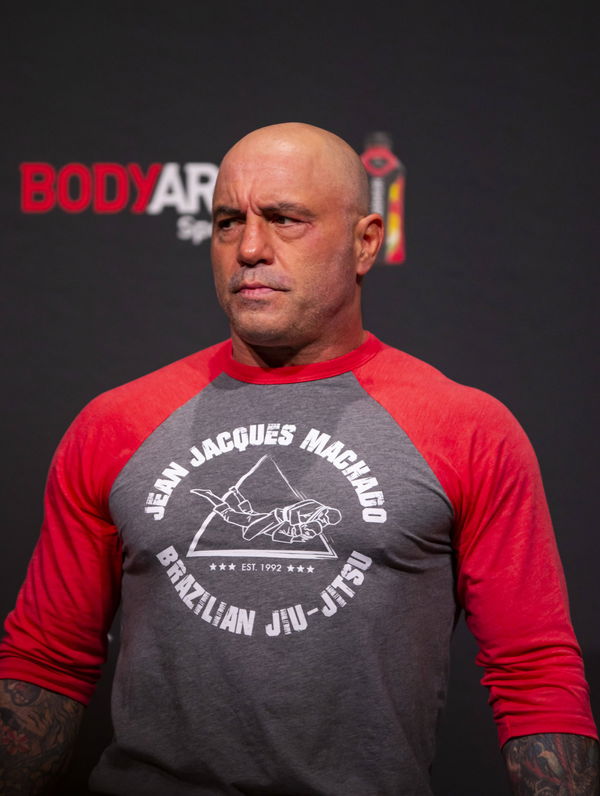

Last year, after UFC 298, the California State Athletic Commission flagged seven UFC fighters over rehydration. These seven had gained 15% or more of their weight after the weigh-ins, prompting CSAC to convene and revisit their rules. And CSAC is arguably the one commission that tries its best to limit dehydration/rehydration weight differences. And Joe Rogan is all for such measures!
Watch What’s Trending Now!
The debate about UFC fighters’ weight cuts has flared up again, and this time, Rogan is advocating for significant change. On the most recent JRE MMA Show, the UFC commentator did not hold back, criticizing the very system that allows athletes to dehydrate themselves dangerously in order to make weight. He argued that the tactic, which is popular in MMA and other combat sports, could be considered cheating and compared it to steroid use, calling attention to a larger issue while suggesting big adjustments that the UFC needs to implement.
ADVERTISEMENT
Joe Rogan criticizes current weight-cutting practices
Joe Rogan made a direct connection between extreme weight cutting and doping, underlining ethical and safety concerns. “Imagine if people did dehydrate and rehydrated and we started calling it cheating,” he said on JRE MMA show #170, saying that if fighters were caught manipulating weight in this way, the public would criticize it just as harshly as steroid use.
The risk isn’t just theoretical; dehydrated athletes are more likely to be injured, perform poorly, and have long-term health problems, yet the practice is common in MMA. According to the JRE host, the UFC’s weight class structure contributes significantly to the problem. Large gaps between divisions, notably from 185 to 205 pounds, motivate fighters to make severe weight reductions in order to obtain a competitive advantage.
Top Stories
Dana White’s Nightmare Continues as UFC 325 ‘Robbery’ and Paramount+ Issues Anger Fans

“Rest in Peace”: Conor McGregor Joins Millions in Mourning Late ‘Home Alone’ Star Catherine O’Hara

UFC Star Gives Classy Response to Inappropriate Question About Ian Garry’s Family Amid Race to Fight Islam Makhachev

UFC 325 Payouts: How Much Will Alexander Volkanovski, Diego Lopes, and Others Earn

Jon Jones Reacts to His Name Coming Up in Epstein Files

Joe Rogan highlighted the severity by referring to fighters who fluctuate dramatically between weigh-in and fight night, pointing out that even casual spectators may not understand how these differences translate into enormous physical advantages. He told guest Michael “Venom” Page, “For maybe people who’ve never grappled, they don’t know what that means, or never been punched, they don’t know what that means.”
ADVERTISEMENT
He further added that weight disparities have serious effects in the cage. A fighter who rehydrates 20 pounds or more above the official weigh-in limit gets substantial strength and leverage, particularly during grappling and striking exchanges. “That’s a giant amount of horsepower and gravity on top of you.”
Just think back to UFC 320 two weeks ago. Alex Pereira made two headlines. One on fight night for the KO win. And the second, for his 28 lbs weight gain on fight day. That’s roughly a 14% gain. But coming in 28 lbs heavier on fight night is a huge advantage in terms of power and endurance.
ADVERTISEMENT
To address these risks, the UFC commentator proposed creating more frequent weight classes spaced about 10 pounds apart, such as 145, 155, 165, and 175 pounds. This approach would encourage fighters to compete closer to their natural weight, reducing the need for dangerous dehydration and creating fairer matchups. In addition, Joe Rogan advocated hydration monitoring, which is similar to unannounced drug testing.

USA Today via Reuters
MMA: UFC 274 – Weigh Ins, May 6, 2022 Phoenix, Arizona, USA UFC announcer Joe Rogan during weigh ins for UFC 274 at the Arizona Federal Theatre. Mandatory Credit: Mark J. Rebilas-USA TODAY Sports, 06.05.2022 15:07:43, 18218608, NPStrans, UFC, Joe Rogan, MMA PUBLICATIONxINxGERxSUIxAUTxONLY Copyright: xMarkxJ.xRebilasx 18218608
Fighters would need to show up properly hydrated, with violations treated as sanctioned cheating. “Like people show up for drug tests now, you’d just knock on their door and check hydration,” he said, suggesting that this would prevent drastic cuts and make competition safer. It is worth noting that this isn’t the first time that he has raised his voice against the issue; as for the JRE host, this has long been a major concern.
ADVERTISEMENT
The hydration hack remains a thorn in the eye for Rogan
The consequences of excessive weight loss are clear in many cases. Gleison Tibau once lost nearly 45 pounds to become a lightweight, then rehydrated to over 180 pounds on fight night. Renan Barao struggled to reach bantamweight, fainting during cuts and experiencing career setbacks. Khabib Nurmagomedov, Yoel Romero, Chris Weidman, and Daniel Cormier all suffered severe dehydration, with some requiring hospitalization or near-life-threatening conditions.
Rogan has consistently expressed his worry throughout the years, including in previous JRE MMA Show episodes, and he is adamantly opposed to same-day weigh-ins. He used chaotic situations like last-minute replacements and catchweight matches to show how current protocols put fighters at unnecessary risk. One example of it was the 63rd edition of the “JRE MMA Show,” where the UFC commentator talked about Dan Ige‘s last-minute fill-in against Diego Lopes.
ADVERTISEMENT
On the night of UFC 303, Brian Ortega‘s sudden illness forced Ige into action on short notice, and with little time to prepare, the fighters were unable to compete at their agreed-upon weight. Rogan critiqued this scenario as an illustration of how existing weight-cutting tactics and rigid division structures create dangerous conditions, referring to it as “sanctioned cheating” similar to steroid use.
He emphasized that same-day weigh-ins would exacerbate these risks, potentially resulting in more injuries, and that head trauma frequently occurs in lighter weight classes where fighters are dehydrated and weakened, not just among heavyweights, emphasizing the critical need for regulatory changes to protect athlete safety. The combination of drastic cuts and ill-timed weigh-ins could endanger both safety and performance, not just in MMA but also in boxing, as the JRE host earlier highlighted.
While Joe Rogan admits there is no perfect solution, he emphasizes that the sport must adapt. By establishing smaller weight classes, hydration monitoring, and safer weigh-in standards, MMA can safeguard athletes, maintain fairness, and finally recognize extreme weight cutting as a dangerous and unfair practice, rather than a tolerated norm.
ADVERTISEMENT
ADVERTISEMENT
ADVERTISEMENT
ADVERTISEMENT